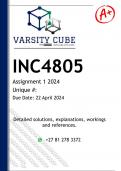The Principles of Biomedical Ethics (8th edition)
annotations are not derived from the book
Chapter 4: Respect for Autonomy
“The autonomous individual acts freely in accordance with a self-chosen plan, analogous to the way
an autonomous government manages its territories and sets its policies.”
- Liberty: this part reflects on the acting freely, there are no influences controlling you.
- Agency: this part reflects on the self-chosen plan, it’s the “capacity for intentional action”
Theories of autonomy
In this chapter there will be a focus of autonomy as a autonomous choice, because even people who
are able to make a autonomous choice sometimes fail to do so. – when someone is able to sign
something, but doesn’t understand/holds all the information relevant to decide.
split-level theories
In these theories a distinction is made between first-order (the basic) and second-order (higher)
desires or preferences. It states that when a first-order choice/action is not in line with the second-
order desires/preferences, it’s not an autonomous decision. – an example given in the book; an
alcoholic has a first-order desire to drink, a second-order desire to stop drinking.
- An argument against this theory: second-order desires/preferences can be derived from first-
order desires/preferences (which can be seen as contradictory to autonomous decisions)
Three-condition theory – of B&C
The starting point of this theory are the nonideal conditions with regards to autonomy.
- Intentionality: an intentional action requires a series of planned events needed to execute
the ‘autonomous action’
- Understanding: if someone doesn’t understand the consequences of an action or the action
in itself, it can not be autonomous. Because you don’t know what you’re deciding.
- Noncontrol: influences on the autonomous action, these can be externally (one person on
another) or internally (illness). Influences can limit voluntariness, and therefore an
autonomous decision.
Autonomy, authority, community and relationships
- Some argue that the authority of another party which dictates behaviour is in conflict with
autonomy. You can’t decide on your own how to behave, but you’re told how to behave by
someone/thing that holds authority. – you can autonomously choose to follow government
rules/religious rules (e.g.) because they believe it’s a legitimate source of guidance.
- Others argue you can look at autonomy through relationships – relational autonomy – “the
conviction that persons’ identities and choices are generally shaped, for better or worse,
through social interactions and intersecting social determinants such as race, class, gender,
ethnicity, and authority structures” >>> choices are shaped through relations with social
determinants, because those are the things that shape you and thus are also of an influence
on what you want.
The principle of respect for autonomy
annotations are not derived from the book
Chapter 4: Respect for Autonomy
“The autonomous individual acts freely in accordance with a self-chosen plan, analogous to the way
an autonomous government manages its territories and sets its policies.”
- Liberty: this part reflects on the acting freely, there are no influences controlling you.
- Agency: this part reflects on the self-chosen plan, it’s the “capacity for intentional action”
Theories of autonomy
In this chapter there will be a focus of autonomy as a autonomous choice, because even people who
are able to make a autonomous choice sometimes fail to do so. – when someone is able to sign
something, but doesn’t understand/holds all the information relevant to decide.
split-level theories
In these theories a distinction is made between first-order (the basic) and second-order (higher)
desires or preferences. It states that when a first-order choice/action is not in line with the second-
order desires/preferences, it’s not an autonomous decision. – an example given in the book; an
alcoholic has a first-order desire to drink, a second-order desire to stop drinking.
- An argument against this theory: second-order desires/preferences can be derived from first-
order desires/preferences (which can be seen as contradictory to autonomous decisions)
Three-condition theory – of B&C
The starting point of this theory are the nonideal conditions with regards to autonomy.
- Intentionality: an intentional action requires a series of planned events needed to execute
the ‘autonomous action’
- Understanding: if someone doesn’t understand the consequences of an action or the action
in itself, it can not be autonomous. Because you don’t know what you’re deciding.
- Noncontrol: influences on the autonomous action, these can be externally (one person on
another) or internally (illness). Influences can limit voluntariness, and therefore an
autonomous decision.
Autonomy, authority, community and relationships
- Some argue that the authority of another party which dictates behaviour is in conflict with
autonomy. You can’t decide on your own how to behave, but you’re told how to behave by
someone/thing that holds authority. – you can autonomously choose to follow government
rules/religious rules (e.g.) because they believe it’s a legitimate source of guidance.
- Others argue you can look at autonomy through relationships – relational autonomy – “the
conviction that persons’ identities and choices are generally shaped, for better or worse,
through social interactions and intersecting social determinants such as race, class, gender,
ethnicity, and authority structures” >>> choices are shaped through relations with social
determinants, because those are the things that shape you and thus are also of an influence
on what you want.
The principle of respect for autonomy






